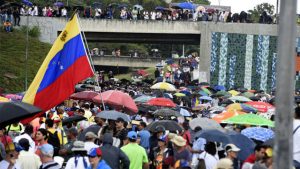 ST JOHN’S, Antigua (CMC)– Prime Minister Gaston Browne has advised his Caribbean Community (Caricom) colleagues to stay out of the internal affairs of Venezuela where opposition forces have been staging street demonstrations over the months in a bid to force President Nicolas Maduro out of office.
ST JOHN’S, Antigua (CMC)– Prime Minister Gaston Browne has advised his Caribbean Community (Caricom) colleagues to stay out of the internal affairs of Venezuela where opposition forces have been staging street demonstrations over the months in a bid to force President Nicolas Maduro out of office.
Last month Caricom foreign ministers called for non-interference in the internal affairs of Venezuela where several people have been killed in street demonstrations.
“In so far as intervening in the affairs of any state we are against that. We have taken that position at the OAS (Organisation of American States) and we have stood by that principle. We have stood by the principle of non-interference, we have stood by the principle of respecting the sovereignty and independence of states,” Browne said in an interview broadcast on the state-owned ABS television.
He told viewers that his administration is concerned about the situation in Venezuela, adding “clearly the situation is getting more and more intense but ultimately it has to be resolved by the Venezuelan people”.
Earlier this month, St Vincent and the Grenadines Prime Minister Dr Ralph Gonsalves praised Caricom countries for acting “with independence, courage and concerted action” during the OAS Permanent Council meeting called to discuss the situation in Venezuela.
In a two-page letter sent to Irwin La Rocque, the Caricom Secretary General, Prime Minister Gonsalves said that the “Caricom stance is a tribute to our region’s commitment to the highest ideals of our Caribbean civilisation and of its institutional expression, politically, the independent and sovereign nation-state”.
In his letter, which was copied to heads of state and governments in Caricom and obtained by the Caribbean Media Corporation (CMC), Gonsalves said he was “humbled and proud of the majesty of Caricom’s united stance in defence of the principle of non-interference in the internal affairs of states; the bedrock ideas of sovereignty and independence (and) the nobility of the fundamental precepts of representative democracy”.
Trinidad and Tobago has already called for the removal of the OAS Secretary General Luis Almagro, over what it claims is his non-neutral position on the political situation in Venezuela and warned Caricom grouping of the possibility of destroying “itself as an honest broker with respect to any involvement in assistance to Venezuela and its internal problems”.
“Trinidad and Tobago registered a strong objection to the behaviour of the OAS leadership. The public servants from the OAS took it upon themselves to engage the Government of Venezuela, the president in fact, in a very derogatory manner,” Prime Minister Dr Keith Rowley told a news conference.
Last month, several former heads of state and governments in Latin and Central America called on Caribbean governments to openly condemn the ongoing political unrest in Venezuela.
In an open letter to the Caribbean leaders, the former leaders including Felipe Calderón of México, Oscar Arias of Costa Rica, Mireya Moscoso of Panamá and Alfredo Cristiani of El Salvador, say they want to express “our indignation and strong public condemnation of the flagrant and escalating repression by the dictatorial and military government of Nicolás Maduro in Venezuela”
The former Latin and Central American leaders said that the right to peaceful protest is recognised under international human rights law.
“In the case of Venezuela, it is now the only legitimate and constitutional manner for citizens to express themselves since the Maduro regime refuses to allow democratic and electoral alternatives. This is because the Maduro government, supported by the Constitutional Chamber of the Venezuelan Supreme Court of Justice, refused to recognise the National Assembly, and instead decided to govern by decree, suspend elections and declare martial law.”
Browne told ABS Television his government will not support regime changes fermented in a clandestine manner by some countries in the Americas.
“They have some countries in the hemisphere who are supporting the opposition because they have a beef with Maduro, they want to see the back of Maduro. In fact they are supporting regime change clandestinely.
“In the case of Antigua and Barbuda we call a spade a spade and we know exactly what they are doing. So recently we had this discussion at Caricom and Ralph and I took a very strong position based on principle and we said to all our colleagues in Caricom we are not supporting any form of regime change in Venezuela.
“Let them resolve the issues we are calling for dialogue and for common sense to prevail,” Browne told television viewers, adding that the opposition must take some of the blame regarding the situation in Venezuela.
